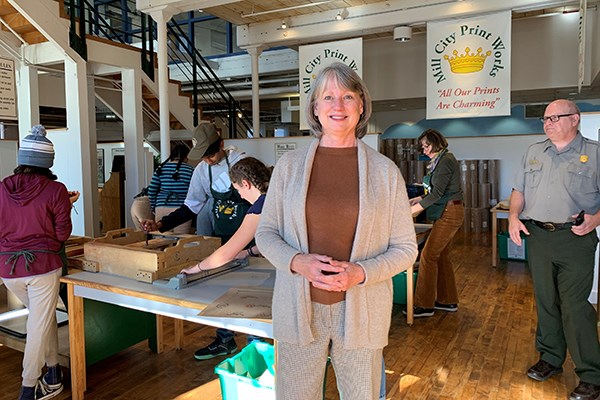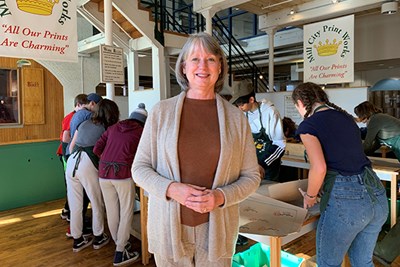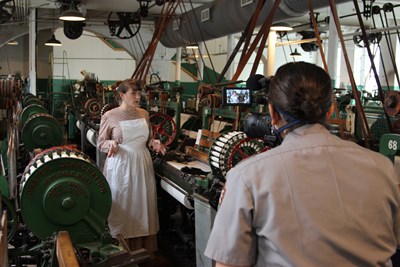Sheila Kirschbaum ’76, ’14 Receives Patrick J. Mogan Learning City Award
 Image by K. Webster
Image by K. Webster
10/11/2024
By Katharine Webster
Sheila Kirschbaum ’76, ’14 has long been dedicated to providing hands-on experiences that help schoolchildren understand Lowell’s environment, technology and history, from the rise of its textile mills to the ties with Southern cotton plantation slavery that fed that growth.
Now Kirschbaum, the director of the Tsongas Industrial History Center, an education partnership between the university’s School of Education and Lowell National Historical Park, is being recognized for her contributions to experiential learning, literacy, curriculum development, professional teacher development and the city with the 2024 Patrick J. Mogan Learning City Award.
The award is given annually by the Lowell City of Learning Awards Committee to a person or group that embodies Mogan’s values and beliefs about learning.
Kirschbaum says it’s an honor to be recognized for carrying on Mogan’s legacy. Although she never met Mogan, she sought out information about him when her son began attending a Lowell magnet school where students were paid in “Mogans” for completing various tasks.
 Image by K. Webster
Image by K. Webster
“I was tickled pink and overwhelmed when I found out I was getting this award,” she says. “Pat Mogan was a former school superintendent who believed in Lowell and saw that you could have a museum without walls in this city, because everywhere you looked, there was something you could learn from.”
Kirschbaum has been on staff almost since the Tsongas Industrial History Center opened in October 1991. The center educates schoolchildren through visits to park exhibits and hands-on classrooms where they can build canals, weave, “work” on an assembly line – and go on strike. All of the field trips align with state and national curriculum standards.
Earlier in her career, Kirschbaum – a double-River Hawk with a bachelor’s degree in English and secondary education and a doctorate in education – taught English at a New Hampshire high school and then at Rivier University in Nashua, New Hampshire, where she had earned a master’s degree in English.
Then, in spring 1992, she was offered a temporary job as a part-time museum teacher at the brand-new Tsongas Industrial History Center.
“It was hands-on industrial history, which is human history. I was hooked,” says Kirschbaum, who eventually got a permanent job and rose to become the center’s director in 2011.
“I was enacting what Patrick Mogan envisioned: educating students and teachers about the city through artifacts, primary documents, the canals and buildings and architecture, the Suffolk Mill turbine exhibit, the Boott Cotton Mills weave room and the boarding house and immigration exhibits.”
 Image by K. Webster
Image by K. Webster
Over the past 33 years, more than 1.4 million students, summer campers, teachers, international educators, and National Science Foundation and National Endowment for the Humanities-funded teaching fellows have attended the center’s programs in person. Hundreds of other students and teachers across the country and the world have participated in the live, interactive online field trips the center developed during the COVID-19 pandemic.
Kirschbaum says she’s proudest of two accomplishments: helping to create and sustain a partnership with the Lowell public schools that now brings students in grades 2 through 5 on field trips to the center, and a new project to make the center’s programs more accessible through visual aids and translations to schoolchildren who are learning English, starting with the “Yankees and Immigrants” field trip.
“Knowing that we can make a big difference for those non-native English learners is really exciting for me,” says Kirschbaum, who also tutors immigrants in English through the Literacy Volunteers of Massachusetts.
Kirschbaum also volunteers on the board of the Angkor Dance Troupe and serves as president of the board of the Lowell Parks and Conservation Trust, which is helping to convert the last working farm in Lowell into a wildlife sanctuary that will eventually include an environmental education center.
That’s just another manifestation of Mogan’s vision, which permeates the city and has enriched her own life immensely, she says.
“I’ve learned a lot in the way that Patrick Mogan thought people could learn, from the historic environment, from the city as a museum, but also from the museums in the city, especially Lowell National Historical Park’s remarkable artifacts and exhibits,” she says. “In addition, I’ve learned from the people involved with all the institutions of learning in this city, including UMass Lowell.”


